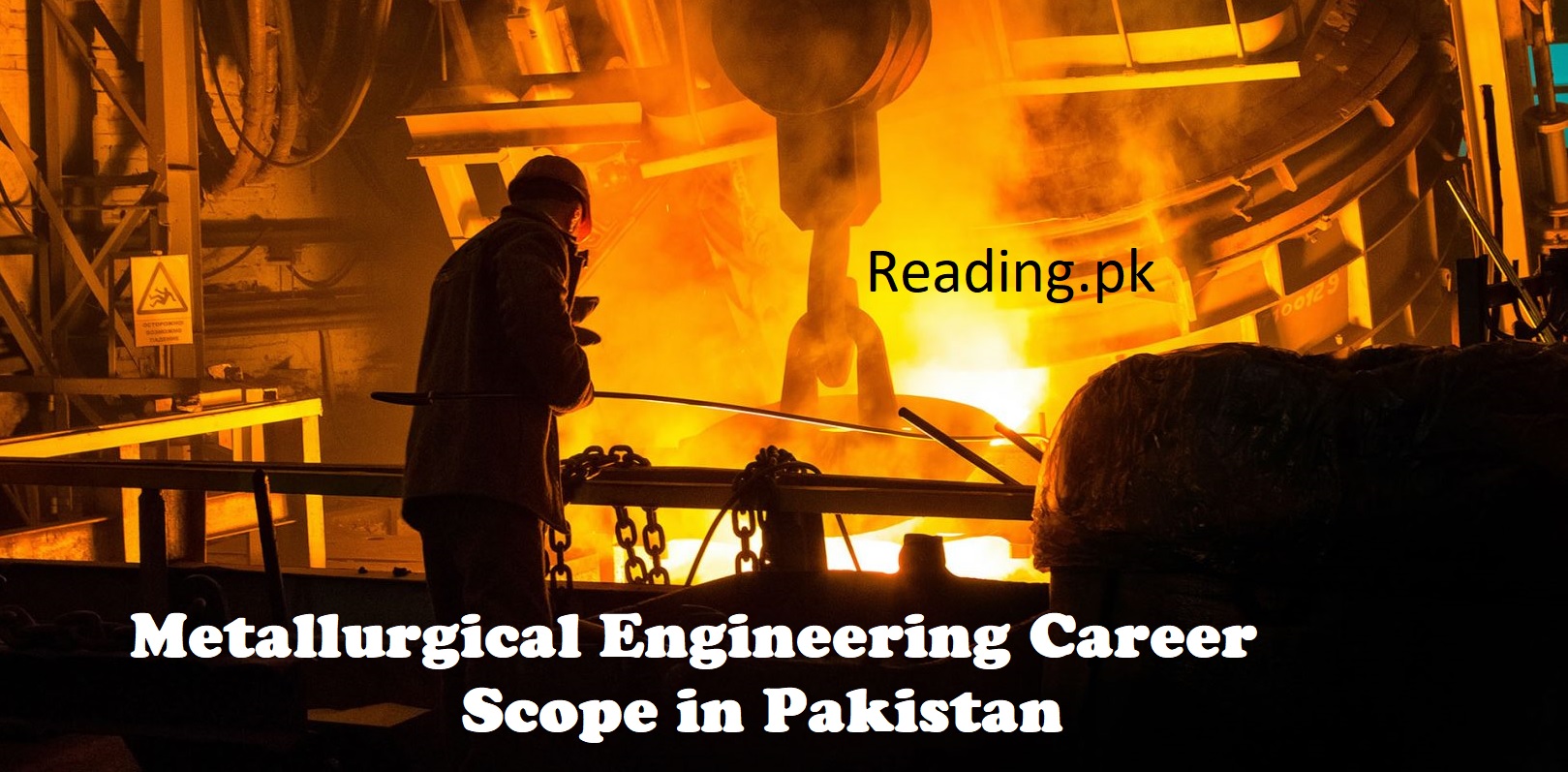Students interested in the engineering field should take a look at Metallurgical Engineering Career Scope in Pakistan. Find out more regarding Metallurgical Engineering Career, job opportunities and courses, subject areas, and admissions requirements, as well as the requirements for obtaining a degree in related areas. The field of metallurgy is one of engineering and materials science that investigates the chemical and physical properties of metal elements, their inter-metallic compound, and their combinations known as alloys. It is used to distinguish metals from their ore. The study of Metallurgical Engineering involves the study of extraction and mining of metals and what happens to metals when exposed to environmental stress or changes in their environment.
Metallurgical Engineers investigate and examine the properties of metals like aluminum, iron, and nickel, as well as steel and copper. They use these to make various materials and products with the necessary characteristics. If you’ve thoroughly understood these metals, such as nickel, steel, and aluminum, you’ll be employed by the relevant factories in which various products are produced. Additional information about job scope and salaries is discussed in this article to discover the options available to you after earning a metallurgical engineering degree in Pakistan.
Metallurgical Engineering Scope in Pakistan
A broad scope for any program of study or work area can be easily assessed concerning the jobs available after the course. A person can get hired as an engineer in various industries and factories, in which metals are made from the position of alloying to create attractive and valuable materials like the production of iron bars for multiple containers as well as the vehicles’ chases and other cars are also made using different metals, and many other items that are manufactured with the help of metals.
We’re providing below the job areas that offer work after completing your studies. Metallurgical Engineering has a good field of study in Pakistan. It is a broad area covering all sorts of manufacturing industries, as well as in which metals and their alloys are utilized. Material and metallurgy engineering has an enormous scope across the nation. Students should be encouraged to look into opportunities in this exciting and fundamental engineering field to help make their future bright.
Graduates can find jobs in a variety of sectors and manufacturing. A degree in advanced metals can assist a worker get a job in study and development. It can also be helpful for someone hoping to secure a management post in a company that is committed to the area. Graduates can be able to teach at universities and colleges or even become a consultant for the government. The list of job sectors in metallurgical engineering can be found below.
Metallurgical Engineering Career Opportunities
- Manufacturers of stainless steel and steel.
- Miners and refiners of various metals like copper and aluminum.
- Copper producers produce semi-finished products, such as sheets and wire, as well as final products.
- Defense industries (Ammunition/Weaponry)
- Private and public laboratories
- Industries that manufacture
- Automobile industry
- Mining sector
- Plants that produce Atoms (Uranium extraction and Enrichment)
- Alloys making industries.
- Mechanical industries.
- Construction firms that are heavy (Dams, bridges, and skyscrapers)
- Production factories for surgical instruments.
- Specialists in producing precious metals such as silver and gold; foundries that make steel and iron castings.
Metallurgical Engineering Career Scope in Pakistan
Metallurgical Engineers Work Nature
Engineers from the field of metallurgical design have come up with methods of treating metals and transforming them into valuable products. The science of metallurgy, which deals with metals, is one of the material sciences. Other material sciences include ceramics, physical metallurgy, and polymer chemistry, also known as plastics. Metallurgical engineers, a sub specialty within the field of materials engineers, are employed mainly in the industrial sector, specifically in the steel and iron industries. Some work with other types of metals, such as aluminum and copper. Metallurgical engineers also work in factories that manufacture machines and other products made of metal, including vehicles and electronic equipment.
They may also work for governments, colleges, and universities. The work of metallurgical engineers is comparable to that of metallurgists, also known as metallurgical scientists. Engineers in the field of metallurgical use sophisticated equipment like electron microscopes, X-ray machines, and spectrographs. They utilize the most up-to-date technological and scientific discoveries when they work. Technicians usually assist metallurgical engineers in the field of metallurgical engineering.
Metallurgical engineers working in extractive metallurgy are in labs, ore treatment refineries, plants, and steel mills. They’re interested in finding innovative and efficient ways to separate small quantities of metal from massive amounts of waste rocks. They should consider the impacts the process has on the planet, energy conservation, and proper disposal of waste rock.
How to become Metallurgical Engineer?
Three paths lead to the position of Metallurgical Engineer.
- successfully complete a BSc Engg in Metallurgical Engineering
- Complete a BSc Engineering degree in a relevant discipline, such as Chemical, Mining, or Mineral Process engineering.
- Chemical or mining technology, or a related area, DAE/B.Tech
Responsibilities of Metallurgical Engineers
- Develop and improve the processes that are used to extract the metal from the ore
- Learn how to enhance the properties that metals have, i.e., malleability, strength, etc.
- Make use of different metals in the production of an innovative and necessary material
- Conduct experiments to determine the strengths and weaknesses of metals.
- Oversee mineral extraction processes
- Creates innovative alloys (mixtures of metals)
- Test metals and other materials to ensure good quality
- Study the physical properties and structure of metals.
- Make the metals in the desired shapes by rolling, casting, or casting.
- Prototypes and metal components to design.
How to Join Metallurgical Engineering?
Students interested in studying material engineering should be taking high school math courses like trigonometry, algebra, and calculus. They should also take classes in science, like biology and chemistry, as well as the study of physics and computer programming. There are three paths to being a Metallurgical Engineer.
- Full BSc Engineering degree in Metallurgical Engineering
- Complete BSc Engineering diploma in one related field, i.e., Chemical Mining, Mineral, Mining Process engineering.
- DAE/B.Tech in mining or chemical Technology or related areas.
- BS Metallurgical Engineering (Hons)
Metallurgical Engineering Subjects
It is an undergraduate four-year honors degree offered by various universities that have their curriculum for this course. If you’re among students seeking admission to Metallurgical engineering, you’ll study the following subjects in Metallurgical Engineering in Pakistan.
- Engineering Drawing & Graphics
- Composite & Polymeric Materials
- Manufacturing Technology
- Powder Metallurgy
- Communication Skills
- Materials Thermodynamics
Criteria for Admission
- Minimum 60% Marks in FSc Pre-Engineering.
- Passing Entry Test.
- The range of merit is 75-79% for Government Universities.
- DAE, as well as B.Tech degree holders, are also eligible to apply.
The study of metallurgical engineering involves the analysis of metals. Combining theory and practical, degree programs focus on the extraction, mining, and design of metals and the way metals react to stress or environmental changes. Students also study fundamental engineering concepts.
Skills Required
Engineers’ most essential abilities that need to be cultivated include commercial awareness and innovation. The field demands the ability to organize and communicate and interpersonal skills. These qualities, such as problem solving and communication abilities, are required to be fully included in the engineers. Team working abilities and analytical abilities are essential without a doubt.
This is all the details about this field. We hope you’ve grasped the fundamentals in this area. If you’ve worked in this area, let us know about it. Tell us if you would recommend this field to others and if you would recommend it to them. There are a lot of scopes concealed in this area. It’s all about your level of exploration and dedication to determine how far you can expect when you become an engineer in metallurgical engineering.
Related Fields of Metallurgical Engineering
Numerous fields are linked to the field of Metallurgical Engineering. If you’re unable to locate an accredited university in your area that provides the field of metallurgical engineering, you can apply for admission to these areas:
- Chemical Engineering
- Materials Engineering
- Mining Engineering
- Mineral Process Engineering
Metallurgical Engineering Salary In Pakistan:
In Pakistan, the initial wage ranges from Rs. 35, 000 to Rs. 50,000 per month after metallurgical engineering. It is a well-paying vocation that leads to a beginning wage package that is rather generous. While starting your own job would benefit you in holding a profitable business, even with little to no working experience, your monthly income might reach Rs. 1 lakh or more.
Universities Offering Metallurgical Engineering In Pakistan:
- Mehran University of Engineering and Technology
- Dawood University of Engineering and Technology
- University of Engineering and Technology Taxila
- NED University of Engineering and Technology
- University of Engineering and Technology Lahore
- University of Punjab
- Bahauddin Zakariya University Multan

